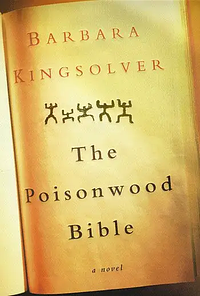Take a photo of a barcode or cover
Reread this book after a recommendation of a friend. I don't remember when I initially read it but I knew enough to remember it doesn't end well. 1960s evangelist preacher decides to take his wife and 4 daughters to the Congo on a mission trip. This trip is not supported and is generally unauthorized. Living on a small stipend, the preacher makes no attempts to understand who he is living with, what their lives are, or their beliefs. He does not recognize either signs of kindness or acts to show him that he amd his family are a drain on resources. He refuses to leave after all missions are leaving, safe passage secure due to his own ego. After his youngest dies, his wife recognizes that he dies not see any of them and the family falls apart, going their own ways to survive. The book is told from the perspectives of the daughters with short introductions to each section by the wife/mother. He has no sections but chokes the book in earlier segments with control and patriarchy.
adventurous
dark
emotional
informative
reflective
sad
slow-paced
Plot or Character Driven:
Character
Strong character development:
Yes
Loveable characters:
No
Flaws of characters a main focus:
Yes
The themes are not subtle. The Price women paid for the sins of their father all in tragic and cruel ways.
The writing styles from each woman were distinct and having only women narrators was a good choice.
Overall, I think it was too long and meandering for me. However, the fact that it still felt so relevant decades later is impressive.
It should be required reading for any missionary.
The writing styles from each woman were distinct and having only women narrators was a good choice.
Overall, I think it was too long and meandering for me. However, the fact that it still felt so relevant decades later is impressive.
It should be required reading for any missionary.
Graphic: Child abuse, Child death, Domestic abuse, Suicide, Religious bigotry, Schizophrenia/Psychosis
medium-paced
4.5*. An accurate portrayal of what makes up most of Africa, through the eyes and mouths of babes. Meticulously researched and part-lived experience of the Congo, which deflates just about any ideology into natural idiocy.
I swithered about 5*, because it really is excellent. However, I didn't find the writing particularly relatable, but this is probably because I am a man. The voices are sometimes plaintive and victim-ey; as to be expected from a vulnerable woman and four little girls thrust into such a harsh cultural clamshell.
Overall an excellent job. Definitely goes straight into my list of top African novels.
I swithered about 5*, because it really is excellent. However, I didn't find the writing particularly relatable, but this is probably because I am a man. The voices are sometimes plaintive and victim-ey; as to be expected from a vulnerable woman and four little girls thrust into such a harsh cultural clamshell.
Overall an excellent job. Definitely goes straight into my list of top African novels.
As the son (and brother) of a Baptist minister, I was immersed in similar religious environment as a child and teenager. It was very interesting to follow the story of the misguided minister and the impact it had on his family. I knew nothing about Congo, and that story was also very interesting. I’m glad that I read this book, and I recommend it highly!
challenging
dark
emotional
reflective
medium-paced
Plot or Character Driven:
Character
Strong character development:
Yes
Loveable characters:
Yes
Diverse cast of characters:
Yes
Flaws of characters a main focus:
Yes
adventurous
challenging
emotional
reflective
sad
tense
medium-paced
Plot or Character Driven:
A mix
Strong character development:
Complicated
Loveable characters:
Complicated
Diverse cast of characters:
Yes
Flaws of characters a main focus:
Yes
emotional
medium-paced
Plot or Character Driven:
Character
Strong character development:
Yes
I love ambitious epics and I had a lovely time reading this book. I felt for the characters and learned with them, and on top of that got to learn a lot about the Congo’s postcolonial history.
Barbara Kingsolver is really very good at storytelling and shines in this multiple POV format; I found it interesting to witness how different members of the same family experience and carry with them their lives on the mission. Also, this book feels incredibly researched and clearly drew concepts and themes from to foundational works grappling with colonialism (Heart of Darkness and Things Fall Apart even being directly referenced which I found pretty funny).
I’m docking a point because there was a big shift in format, pacing, and tone a bit more than halfway through, which made the latter half of the story feel a little unbalanced especially while binging it. I think this might just be a difficult thing for novels tackling such a wide scope — it reminds me very much of how I felt about Pachinko as well.
Barbara Kingsolver is really very good at storytelling and shines in this multiple POV format; I found it interesting to witness how different members of the same family experience and carry with them their lives on the mission. Also, this book feels incredibly researched and clearly drew concepts and themes from to foundational works grappling with colonialism (Heart of Darkness and Things Fall Apart even being directly referenced which I found pretty funny).
I’m docking a point because there was a big shift in format, pacing, and tone a bit more than halfway through, which made the latter half of the story feel a little unbalanced especially while binging it. I think this might just be a difficult thing for novels tackling such a wide scope — it reminds me very much of how I felt about Pachinko as well.


